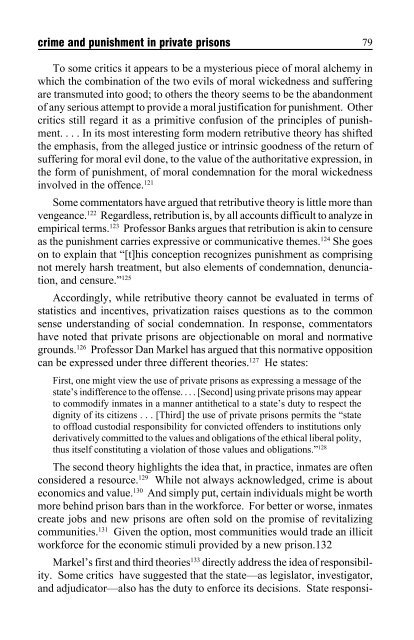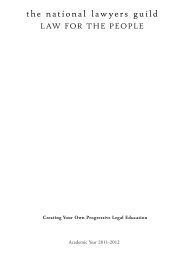Does your library have National Lawyers Guild Review?
Does your library have National Lawyers Guild Review?
Does your library have National Lawyers Guild Review?
Create successful ePaper yourself
Turn your PDF publications into a flip-book with our unique Google optimized e-Paper software.
crime and punishment in private prisons79To some critics it appears to be a mysterious piece of moral alchemy inwhich the combination of the two evils of moral wickedness and sufferingare transmuted into good; to others the theory seems to be the abandonmentof any serious attempt to provide a moral justification for punishment. Othercritics still regard it as a primitive confusion of the principles of punishment.. . . In its most interesting form modern retributive theory has shiftedthe emphasis, from the alleged justice or intrinsic goodness of the return ofsuffering for moral evil done, to the value of the authoritative expression, inthe form of punishment, of moral condemnation for the moral wickednessinvolved in the offence. 121Some commentators <strong>have</strong> argued that retributive theory is little more thanvengeance. 122 Regardless, retribution is, by all accounts difficult to analyze inempirical terms. 123 Professor Banks argues that retribution is akin to censureas the punishment carries expressive or communicative themes. 124 She goeson to explain that “[t]his conception recognizes punishment as comprisingnot merely harsh treatment, but also elements of condemnation, denunciation,and censure.” 125Accordingly, while retributive theory cannot be evaluated in terms ofstatistics and incentives, privatization raises questions as to the commonsense understanding of social condemnation. In response, commentators<strong>have</strong> noted that private prisons are objectionable on moral and normativegrounds. 126 Professor Dan Markel has argued that this normative oppositioncan be expressed under three different theories. 127 He states:First, one might view the use of private prisons as expressing a message of thestate’s indifference to the offense. . . . [Second] using private prisons may appearto commodify inmates in a manner antithetical to a state’s duty to respect thedignity of its citizens . . . [Third] the use of private prisons permits the “stateto offload custodial responsibility for convicted offenders to institutions onlyderivatively committed to the values and obligations of the ethical liberal polity,thus itself constituting a violation of those values and obligations.” 128The second theory highlights the idea that, in practice, inmates are oftenconsidered a resource. 129 While not always acknowledged, crime is abouteconomics and value. 130 And simply put, certain individuals might be worthmore behind prison bars than in the workforce. For better or worse, inmatescreate jobs and new prisons are often sold on the promise of revitalizingcommunities. 131 Given the option, most communities would trade an illicitworkforce for the economic stimuli provided by a new prison.132Markel’s first and third theories 133 directly address the idea of responsibility.Some critics <strong>have</strong> suggested that the state—as legislator, investigator,and adjudicator—also has the duty to enforce its decisions. State responsi-












![NLGRev 68-2[1].indd - National Lawyers Guild](https://img.yumpu.com/30820772/1/167x260/nlgrev-68-21indd-national-lawyers-guild.jpg?quality=85)



